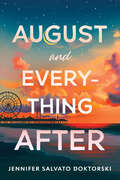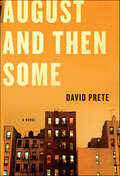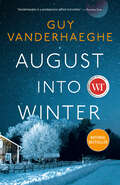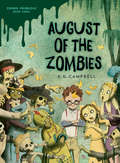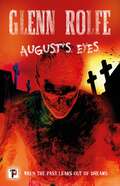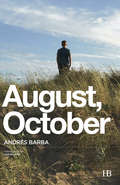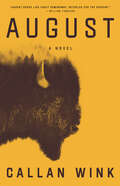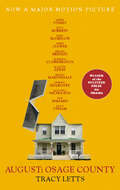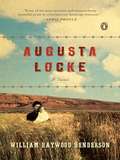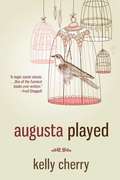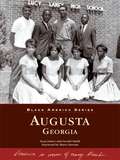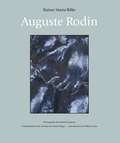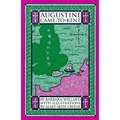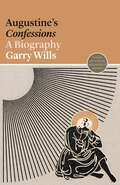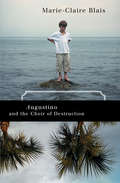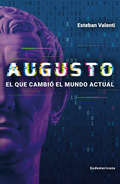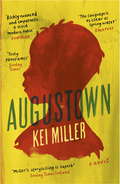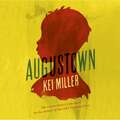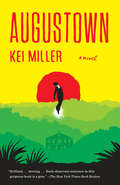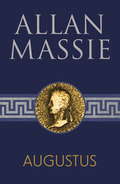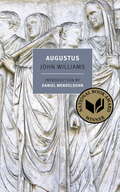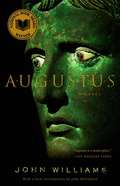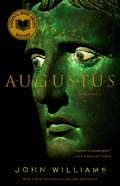- Table View
- List View
August and Everything After
by Jennifer DoktorskiOne last summer to escape, to find herself, to figure out what comes next. Fans of Sarah Dessen and Jenny Han will love this contemporary, coming-of-age romance.Graduation was supposed to be a relief. Except Quinn can't avoid the rumors that plagued her throughout high school or the barrage of well-intentioned questions about her college plans. How is she supposed to know what she wants to do for the next four years, let alone the rest of her life? And why does no one understand that it's hard for her to think about the future—or feel as if she even deserves one—when her best friend is dead?Spending the summer with her aunt on the Jersey shore may just be the fresh start Quinn so desperately needs. And when she meets Malcolm, a musician with his own haunted past, she starts to believe in second chances. Can Quinn find love while finding herself?
August and Then Some: A Novel
by David PreteTwisted bonds between a father and his children lead to revenge and a desperate hope for redemption and forgiveness.In the heat of August, Jake Terri Savage (“JT”), his little sister Danielle, and his bone-headed best friend, Nokey (nicknamed after “gnocchi”), try to steal JT’s father’s beloved 1965 Shelby Cobra. Their reasons are noble; the consequences,devastating.JT’s abusive dad’s idea of a twelfth birthday gift is getting his son involved in a barroom brawl. Nokey’s dad thinks he has potatoes for brains. Both sons live out their fathers’ stunted visions in a way that brings down a terrible judgment on them all—leaving JT hauling rocks for punishment while he staves off panic attacks and nightmares about his sister and her terrible half-known secret.A Dominican teenage girl with little hope for her own future gives JT a second chance to save someone, including himself. Throughout, David Prete’s vivid sense of atmosphere, tight plotting, and crackling dialogue give the dysfunctional family story a new lease on life.
August into Winter: A Novel
by Guy VanderhaegheThe first novel in nearly a decade from the three-time Governor General's Award‒winning author of The Last Crossing, August Into Winter is an epic story of crime and retribution, of war and its long shadow, and of the redemptive possibilities of love.You carried the past into the future on your back, its knees and arms hugging you tighter with every step.It is 1939, with the world on the brink of global war, when Constable Hotchkiss confronts the spoiled, narcissistic man-child Ernie Sickert about a rash of disturbing pranks in their small prairie town. Outraged and cornered, Ernie commits an act of unspeakable violence, setting in motion a course of events that will change forever the lives of all in his wake.With Loretta Pipe—the scrappy twelve-year-old he idealizes as the love of his life—in tow, Ernie flees town. In close pursuit is Corporal Cooper, who enlists the aid of two brothers, veterans of World War One: Jack, a sensitive, spiritual man with a potential for brutal violence; and angry, impetuous Dill, still recovering from the premature death of his wife who, while on her deathbed, developed an inexplicable obsession with the then-teenaged Ernie Sickert.When a powerful storm floods the prairie roads, wreaking havoc, Ernie and Loretta take shelter in a one-room schoolhouse where they are discovered by the newly arrived teacher, Vidalia Taggart. Vidalia has her own haunted past, one that has driven her to this stark and isolated place with only the journals of her lover Dov, recently killed in the Spanish Civil War, for company. Dill, arriving at the schoolhouse on Ernie's trail, falls hard and fast for Vidalia—but questions whether he can compete with the impossible ideal of a dead man.Guy Vanderhaeghe, writing at the height of his celebrated powers, has crafted a tale of unrelenting suspense against a backdrop of great moral searching and depth. His is a canvas of lavish, indelible detail: of character, of landscape, of history—in all their searing beauty but all their ugliness, too. Vanderhaeghe does not shrink from the corruption, cruelty, and treachery that pervade the world. Yet even in his clear-eyed depiction of evil—a depiction that frequently and delightfully turns darkly comic—he will not deny the possibility of love, of light. With August Into Winter, Guy Vanderhaeghe has given us a masterfully told, masterfully timed story for our own troubled hearts.
August of the Zombies (Zombie Problems #3)
by K. G. CampbellIt started out as a small zombie problem. Then four more zombies tagged along. Now there are too many to count! From the acclaimed illustrator of Flora & Ulysses comes the exciting conclusion to the Zombie Problems trilogy.After facing an alligator attack and a paddle boat accident in search of the zombie stone, August comes out unscathed...but emptyhanded. At least Claudette is still by his side, along with a few more zombies. Of course, it isn't long before a few zombies becomes a horde, and August has so many questions: What is he supposed to do with all of these zombies? What is his Aunt Orchid hiding? Will his life ever be like Stella Starz (in her own life)? And most importantly, will he ever find the zombie stone and get everything back to normal?
August's Eyes
by Glenn Rolfe"An intense tale reminiscent of classic works by Jack Ketchum or Stephen King" — BooklistWhen dreams start bleeding into reality, a social worker is forced to face the mistakes of his past.A serial killer has found a way to make his land of graveyards a sinister playground to be bent at his sadistic will.The secrets behind August's eyes will bring two worlds together, and end in a cataclysm of pain and ruin. FLAME TREE PRESS is the new fiction imprint of Flame Tree Publishing. Launched in 2018 the list brings together brilliant new authors and the more established; the award winners, and exciting, original voices.
August, October
by Andrés BarbaFourteen-year-old Tomás goes with his well-off family on their usual seaside summer holiday, but he is at a stage in his life when nothing is the same. Sullenly detached from them, full of confused intimations of sexuality, he is also faced with death when his widowed aunt, who lives in the resort, is taken seriously ill.<P><P> As he becomes close to her on her deathbed he frequents the forbidden in the form of some lower-class village kids—casually transgressive boys and even more alien, sexually knowing girls—that will get him involved on the last day in a gang rape of a vulnerable girl. Though when it is his turn, Tomás only pretends to do it—enough to save face with the boys. Back in Madrid, he wrestles with guilt and confusion. He finally decides to go back secretly, alone, to find the girl and apologize for what happened, but despite the moving scene of atonement and forgiveness, ambiguity lurks even in this redemption.
August: A Novel
by Callan WinkA boy coming of age in a part of the country that’s being left behind is at the heart of this dazzling novel—the first by an award-winning author of short stories that evoke the American West. <P><P> Callan Wink has been compared to masters like Jim Harrison and Thomas McGuane. His short stories have been published in The New Yorker and have won numerous accolades. Now his enormous talents are showcased in a debut novel that follows a boy growing up in the middle of the country through those difficult years between childhood and adulthood. <P><P>August is an average twelve-year-old. He likes dogs and fishing and doesn’t mind early-morning chores on his family’s Michigan dairy farm. But following his parents’ messy divorce, his mother decides that she and August need to start over in a new town. There, he tries to be an average teen—playing football and doing homework—but when his role in a shocking act of violence throws him off course once more, he flees to a ranch in rural Montana, where he learns that even the smallest communities have dark secrets. <P><P>Covering August's adolescence, from age twelve to nineteen, this gorgeously written novel bears witness to the joys and traumas that irrevocably shape us all. Filled with unforgettable characters and stunning natural landscapes, this book is a moving and provocative look at growing up in the American heartland.
August: Osage County
by Tracy LettsWinner of the 2008 Pulitzer Prize for Drama"A tremendous achievement in American playwriting: a tragicomic populist portrait of a tough land and a tougher people."--Time Out New York"Tracy Letts' August: Osage County is what O'Neill would be writing in 2007. Letts has recaptured the nobility of American drama's mid-century heyday while still creating something entirely original."--New York magazineOne of the most bracing and critically acclaimed plays in recent Broadway history, August: Osage County is a portrait of the dysfunctional American family at its finest--and absolute worst. When the patriarch of the Weston clan disappears one hot summer night, the family reunites at the Oklahoma homestead, where long-held secrets are unflinchingly and uproariously revealed. The three-act, three-and-a-half-hour mammoth of a play combines epic tragedy with black comedy, dramatizing three generations of unfulfilled dreams and leaving not one of its thirteen characters unscathed. After its sold-out Chicago premiere, the play has electrified audiences in New York since its opening in November 2007.Tracy Letts is the author of Killer Joe, Bug, and Man from Nebraska, which was a finalist for the 2004 Pulitzer Prize for Drama. His plays have been performed throughout the country and internationally. A performer as well as a playwright, Letts is a member of the Steppenwolf Theatre Company, where August: Osage County premiered.
Augusta Locke
by Henderson William HaywoodAn indelible portrait of a woman who through great toughness of character blazes her own trail Novelist William Haywod Henderson has won acclaim for his depictions of land and nature and his ability to bring the American West to vivid life. Of his most recent novel, The Rest of the Earth, Annie Proulx remarked that Henderson "writes some of the most evocative and transcendently beautiful prose in contemporary American literature. " Redolent with myth, humor, strange landscapes, and stark reality, Henderson's new novel tells the story of Augusta Locke, a troubled yet spirited woman, as she raises her daughter in the deserts of Wyoming. Spanning the twentieth century, Augusta's extraordinary challenges play out themes of love and loss, home and family, redemption and reconciliation. .
Augusta Locke
by William Haywood HendersonAn indelible portrait of a woman who through great toughness of character blazes her own trail Novelist William Haywod Henderson has won acclaim for his depictions of land and nature and his ability to bring the American West to vivid life. Of his most recent novel, The Rest of the Earth, Annie Proulx remarked that Henderson "writes some of the most evocative and transcendently beautiful prose in contemporary American literature." Redolent with myth, humor, strange landscapes, and stark reality, Henderson's new novel tells the story of Augusta Locke, a troubled yet spirited woman, as she raises her daughter in the deserts of Wyoming. Spanning the twentieth century, Augusta's extraordinary challenges play out themes of love and loss, home and family, redemption and reconciliation.
Augusta Played
by Kelly CherryA newly married young couple-she is a flutist, he is a graduate student-try to reconcile their differing backgrounds and attitudes. This leads to much merriment and a certain amount of sorrow. The book is set in New York City in the late sixties, with love-ins, riots, performance artists, and assassinations. Other characters include the husband's parents and his father's girlfriend, a stripper, a teenage blackmailer, and an orchestra conductor.
Augusta, Georgia (Black America Series)
by Sean Joiner Marva Stewart Gerald SmithFilled with remarkable vintage photographs, Black America: Augusta, Georgia captures the essence of the African-American heritage in this historic Southern community. The Garden City has produced a wide variety of intellectual and political pioneers, including a handful of educators who were instrumental in the pivotal Brown versus Board of Education case. Within the pages of this volume, their stories unfold.
Auguste Rodin (Lives Of The Artists Ser.)
by Rainer Maria Rilke William H. Gass Michael Eastman Daniel SlagerSculptor Auguste Rodin was fortunate to have his secretary Rainer Maria Rilke, one of the most sensitive poets of our time. These two pieces discussing Rodin¢s work and development as an artist are as revealing of Rilke as they are of his subject. Written in 1902 and 1907, these essays mark the entry of the poet into the world of letters. Rilke¢s description of Rodin reveals the profound psychic connection between the two great artists, both masters of giving visible life to the invisible. Michael Eastman¢ evocative photographs of Rodin¢s sculptures shed light on both Rodin¢s art and Rilke¢s thoughts and catapult them into the 21st century.
Augustine Came to Kent
by Barbara Willard Mary Beth OwensIt is the year 597 and Pope Gregory is sending a select number of his monks, led by Fr. Augustine, to re-evangelize England. Young Wolf, born in that land but raised in Rome, accompanies his father, Wolfstan, who goes as a guide and interpreter. Though the King of Kent's wife is a Christian, the missionaries from Rome do not know whether they will be welcomed, tolerated or martyred. In a story full of adventure, Wolf meets Fritha, a Saxon girl whose life and destiny are soon closely bound up with his own. Events, significant in the history of Christianity, are vividly brought to life by this veteran writer of historical fiction.
Augustine's Confessions: A Biography (Lives of Great Religious Books #3)
by Garry WillsFrom Pulitzer Prize–winner Garry Wills, the story of Augustine’s ConfessionsIn this brief and incisive book, Pulitzer Prize-winning historian Garry Wills tells the story of the Confessions--what motivated Augustine to dictate it, how it asks to be read, and the many ways it has been misread in the one-and-a-half millennia since it was composed. Following Wills's biography of Augustine and his translation of the Confessions, this is an unparalleled introduction to one of the most important books in the Christian and Western traditions.Understandably fascinated by the story of Augustine's life, modern readers have largely succumbed to the temptation to read the Confessions as autobiography. But, Wills argues, this is a mistake. The book is not autobiography but rather a long prayer, suffused with the language of Scripture and addressed to God, not man. Augustine tells the story of his life not for its own significance but in order to discern how, as a drama of sin and salvation leading to God, it fits into sacred history. "We have to read Augustine as we do Dante," Wills writes, "alert to rich layer upon layer of Scriptural and theological symbolism." Wills also addresses the long afterlife of the book, from controversy in its own time and relative neglect during the Middle Ages to a renewed prominence beginning in the fourteenth century and persisting to today, when the Confessions has become an object of interest not just for Christians but also historians, philosophers, psychiatrists, and literary critics.With unmatched clarity and skill, Wills strips away the centuries of misunderstanding that have accumulated around Augustine's spiritual classic.
Augustine's Inner Dialogue: The Philosophical Soliloquy in Late Antiquity
by Brian StockAugustine's philosophy of life involves mediation, reviewing one's past and exercises for self-improvement. Centuries after Plato and before Freud he invented a 'spiritual exercise' in which every man and woman is able, through memory, to reconstruct and reinterpret life's aims. Brian Stock examines Augustine's unique way of blending literary and philosophical themes. He proposes a new interpretation of Augustine's early writings, establishing how the philosophical soliloquy (soliloquium) has emerged as a mode of inquiry and how it relates to problems of self-existence and self-history. The book also provides clear analysis of inner dialogue and discourse and how, as inner dialogue complements and finally replaces outer dialogue, a style of thinking emerges, arising from ancient sources and a religious attitude indebted to Judeo-Christian tradition.
Augustino and the Choir of Destruction
by Marie-Claire BlaisIn Augustino and the Choir of Destrucion literary legend and three-time winner of the Governor General's Literary Award Marie-Claire Blais delivers the third volume in the prize-winning series (These Festive Nights, Thunder and Light, Augustino and the Choir of Destruction, and Rebecca, Born in the Maelstrom) acclaimed as one of the greatest undertakings in modern Quebec fiction. Augustino and the Choir of Destruction is set on an island in the Gulf of Mexico that is home to the full spectrum of humanity: the rich, the poor, the powerful, the humble, artists, criminals. With her unique, signature use of punctuation, Marie-Claire Blais manages to brilliantly show in one flashing stroke men and women; victims and tormentors; child kamikaze pilots and petty thieves from Bahama Street; Charles, a great poet cut down by AIDS; Cinderella, a transvestite prostituting himself to a customer at the Porte du Baiser saloon; Caroline, an artist and photographer who has seen all the hidden treasures of the world; and Augustino, a clairvoyant child-writer. These individual destinies combine in Blais' vision to form a single harmonic texture.
Augusto: El que cambió el mundo actual
by Esteban Valenti- Augusto, el protagonista de esta novela, nació en el seno de una familia uruguaya como muchas. Un niño más entre tantos. Sin embargo, apenas transcurridos sus primeros años de vida, el pequeño cuyo nombre está cargado de presagios se revela como el portador del potencial para cambiar el mundo y acabar con sus inequidades. El mundo en que vivimos es sinónimo de desorden, tensiones, peste e insatisfacción. Las alternativas de cambio son cada día más limitadas o quedan restringidas a las tecnologías, las que constituyen la religión dominante. A través de una narrativa vertiginosa, los lectores asistimos a un cambio dramático en el balance de poderes que rigen a la humanidad, conducidos por un ser humano cuyo nombre, desde el fondo de la antigüedad, trae un mensaje lleno de contradicciones y mentiras. No es esta una novela histórica; más bien es un viaje a través de los principales problemas de nuestra época, teniendo a la historia y la cultura como referencias. Se trata de un duelo entre los grandes poderes mundiales, estatales, privados, contrapuestos a los principios, expectativas y acciones de un luchador incansable y audaz. ¿Cuál será el resultado final? Es este un libro que alienta a entrecerrar los ojos y dejar volar la imaginación, casi sin límites. Queda esbozado lo que ha sido el sueño de grandes personajes a lo largo de los tiempos. ¿Se puede mejorar el mundo, para hacerlo más justo, pacífico e igualitario, llevando una vida en apariencia normal y apacible?
Augustown
by Kei MillerWINNER OF THE OCM BOCAS PRIZE FOR CARIBBEAN LITERATURESHORTLISTED FOR THE RSL ONDAATJE PRIZE, THE GREEN CARNATION PRIZE, and the HISTORICAL WRITERS AWARD'Miller's storytelling is superb' SUNDAY TIMESOne April day in Augustown, Jamaica. Ma Taffy, old and blind, sits in her usual spot on the veranda. No matter how the world tilts around her, come hurricane or riot, she knows everything that goes on in this small community. Which is why, when her six-year-old nephew returns home from school with his dreadlocks shorn, she realises that trouble won't be far behind. And so she tells him the story of Alexander Bedward, the flying preacherman. She remembers what happened to the Rastaman and his helper, Bongo Moody; she thinks of Soft-Paw, the leader of the Angola gang, and what lies beneath her house. For trouble is brewing once more among the ramshackle lanes of Augustown, and as Ma Taffy knows, each day contains much more than its own hours, or minutes, or seconds. In fact, each day contains all of history...
Augustown
by Kei MillerIt is 11 April 1982 and a smell is coming down John Golding Road right alongside the boy-child, something attached to him, like a spirit but not quite. Ma Taffy is growing worried. She knows that something is going to happen. Something terrible is going to pour out into the world. But if she can hold it off for just a little bit longer, she will. So she asks a question that surprises herself even as she asks it, 'Kaia, I ever tell you bout the flying preacherman?'Read Dona Croll(p) 2016 Orion Publishing Group
Augustown: A Novel
by Kei Miller11 April 1982: a smell is coming down John Golding Road right alongside the boy-child, something attached to him, like a spirit but not quite. <P><P> Ma Taffy is growing worried. She knows that something is going to happen. Something terrible is going to pour out into the world. But if she can hold it off for just a little bit longer, she will. <P><P>So she asks a question that surprises herself even as she asks it, "Kaia, I ever tell you bout the flying preacherman?" <P><P>Set in the backlands of Jamaica, Augustown is a magical and haunting novel of one woman’s struggle to rise above the brutal vicissitudes of history, race, class, collective memory, violence, and myth.
Augustus
by Allan MassieAugustus was the founder of the Roman Empire, adopted son of Julius Caesar, friend and later foe of Mark Antony, patron of Horace and Virgil. Frank and forceful, this putative autobiography tells his story from the assassination of Caesar, through his military, political and personal struggles to his final days as Emperor in everything but name.
Augustus
by John Williams Daniel MendelsohnWinner of the 1973 National Book AwardIn Augustus, the third of his great novels, John Williams took on an entirely new challenge, a historical novel set in classical Rome, exploring the life of the founder of the Roman Empire, whose greatness was matched by his brutality. To tell the story, Williams also turned to a genre, the epistolary novel, that was new to him, transforming and transcending it just as he did the western in Butcher's Crossing and the campus novel in Stoner. Augustus is the final triumph of a writer who has come to be recognized around the world as an American master."[In Augustus,] John Williams re-creates the Roman Empire from the death of Julius Caesar to the last days of Augustus, the machinations of the court, the Senate, and the people, from the sickly boy to the sickly man who almost dies during expedi- tions to what would seem to be the ruthless ruler . . . . Read it in conjunction with Robert Graves's more flamboyant I, Claudius and Claudius the God, Hermann Broch's The Death of Virgil, and Marguerite Yourcenar's Memoirs of Hadrian." --Harold Augenbraum, Executive Director of the National Book Foundation
Augustus
by John A. WilliamsA brilliant and beautifully written novel in the tradition of Robert Graves’ I, Claudius, Augustus is a sweeping narrative that brings vividly to life a compelling cast of historical figures through their letters, dispatches, and memoirs. <P><P> A mere eighteen years of age when his uncle, Julius Caesar, is murdered, Octavius Caesar prematurely inherits rule of the Roman Republic. Surrounded by men who are jockeying for power–Cicero, Brutus, Cassius, and Mark Antony–young Octavius must work against the powerful Roman political machinations to claim his destiny as first Roman emperor. Sprung from meticulous research and the pen of a true poet, Augustus tells the story of one man’s dream to liberate a corrupt Rome from the fancy of the capriciously crooked and the wildly wealthy.<P> Winner of the National Book Award
Augustus
by John WilliamsAUGUSTUS tells the story of Octavian, a shy and scholarly youth of nineteen who, on the death of his great-uncle, Julius Caesar, suddenly finds himself heir to the vast power of the Roman Empire. He is destined to rule that world astonishingly well, given the odds and intrigues against him. He would later be known as Augustus Caesar (63 B. C. -14A. D. ), the first Roman emperor. Through the use of fictional letters, memoranda and dispatches, we see how Augustus established his essential base of power and how he was continually obliged to put down, by a subtle combination of force and guile, the challenges of such men as Cicero, Brutus, Cassius and, finally, Mark Antony. The narrative mosaic John Williams has built on impeccable historical research brings Augustus vividly to life. Williams invests his characters with such profound humanity and treats them with such terrible honesty and compassion that we enter into their very lives and times.
